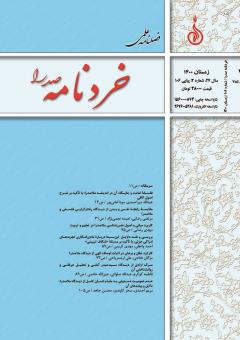کاربرد مبانی و اصول نفسشناسی ملاصدرا در تعلیم و تربیت
محورهای موضوعی : Studies on Mulla Sadra and the Transcendent Philosophy
1 - استادیار گروه علوم تربیتی دانشگاه فرهنگیان، تهران، ایران
کلید واژه: روانشناسي فلسفي, اصول تربيتي, تعليم و تربيت اسلامي, نفس, حركت جوهري اشتدادي, ملاصدرا,
چکیده مقاله :
محور اساسي تعليم و تربيت و بطور خاص تعليم و تربيت اسلامي، نفس (روان) انسان است. در دانش تعليم و تربيت، بمنظور تربيت نفس و روان، مباني و اصولي حاكم است تا با بكارگيري آنها بتوان به اهداف از پيش تعيينشده دست يافت. با توجه به رويكرد ديني در اين پژوهش و نيز قابليتهاي حكمت متعالية صدرايي در اين زمينه، به شناسايي و كاربرد مباني و اصول تعليم و تربيت نفس بر اساس انديشههاي فلسفي ملاصدرا پرداختهايم. برخي از مباني مطرحشده عبارتند از: جوهر مجرد بودن نفس، جسمانيةالحدوث و روحانيةالبقابودن نفس و حركت جوهري اشتدادي آن در مسير تكامل. همچنين در ذيل اين بحث، به اصول تربيتي استنتاج شده از مباني و اهداف پرداخته شده كه از آن جمله ميتوان به تدريج و تعالي مرتبتي، تحولگرايي و اصلاح و بازآفريني در فرايند تربيت نفس اشاره كرد. در اين نوشتار از روش آميختة توصيفي ـ تحليلي و استنتاجي، با بكارگيري منابع كتابخانهيي، در توصيف مفاهيم، تحليل و تبيين مسئله بهره جستهايم. بهاينترتيب، با مراجعه به كتابهاي ملاصدرا (بويژه جلد هشتم و نهم اسفار اربعه) و برخي شارحان آثار وي، به استخراج مباني و استنتاج اصول تربيتي در راستاي تربيت نفس (روان) پرداخته شده است.
The basis of education, in general, and Islamic education, in particular, is the human soul (psyche). In order to educate the soul and psyche, there are some principles that are employed to achieve the predetermined goals and objectives. Given the religious approach of this study and the potentials of the Transcendent Philosophy in this regard, the author has tried to identify and examine the applications of the principles of educating the soul (psyche) based on Mullā Ṣadrā’s philosophical thoughts. Some of these principles include the substance of the soul’s immateriality, the corporeal origination and spiritual subsistence of the soul, and its graded trans-substantial motion in its process of development. Following this, he has dealt with the educational principles inferred from the mentioned principles and the purposes of this study, such as graded transcendence and graduation and transformationalism, reform, and recreation in the process of educating the soul (psyche). This study was conducted following a combination of descriptive-analytic and inferential methods while using library resources in order to describe the concepts and analyze and clarify the problem. The author has specifically referred to Mullā Ṣadrā’s books (particularly al-Asfār, VIII and IX) and the works of some of his commentators in order to extract and infer the related principles employed in the education of the soul.
